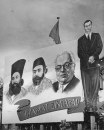Imamat Day Mubarak 2015-07-11
Posted July 10th, 2015 by librarian-hdThis year marks the 58th anniversary of the ascension to the throne of Imamat for Shah Karim al-Husayni our 49th Holy Imam
- 2728 reads
Prince Sadrudin
- 16099 reads
Statement by Prince Sadruddin Aga Khan, U.N. High Commissioner for Refugees, to the Third Committee of the United Nation
Posted June 29th, 2017 by librarian-hdMadam Chairman,
The Committee has before it today two seemingly routine matters: my Annual Report, and the periodic consideration of whether UNHCR should be continued. The agenda, appropriately terse, scarcely conceals its irony.
- Read more
- 5831 reads
Statement by Prince Sadruddin Aga Khan, United Nations High Commissioner for Refugees, to the Third Committee of the United Nati
Posted June 29th, 2017 by librarian-hdMadam Chairman,
The Committee has before it today two seemingly routine matters: my Annual Report, and the periodic consideration of whether UNHCR should be continued. The agenda, appropriately terse, scarcely conceals its irony.
- Read more
- 5256 reads
His Highness the Aga Khan wins Dubai-Duty-Free-Irish-Derby-2016 with Harzand

Dubai Duty Free Irish Derby at the Curragh Racecourse on Saturday 25, June 2016 were the winning connections of the Dubai Duty Free Irish Derby 2016. The winner connections for Harzand, were jockey, Pat Smullen, trainer Dermot Weld and owner His Highness the Aga Khan
- 14281 reads
Hazar Imam wins the Prix de Diane for the record 7th time with Valyra
- 12398 reads
Tanzania: U.S.$40 Million Set to Expand Aga-Khan Hospital Chains
Posted June 16th, 2017 by librarian-hdArusha — The Aga-Khan Hospitals in Dar-es-salaam, Kisumu and Mombasa in Kenya will soon be expanded and upgraded following a financial agreement that has just been signed between the Aga Khan Development Network (AKDN) and French Co-operation Agency (AFD).
- Read more
- 5822 reads
Pamir Energy, a project company of the Geneva-based Aga Khan Fund for Economic Development wins Ashden Award
Posted June 13th, 2017 by librarian-hdThe 2017 International Ashden Award for Increasing Energy Access will be handed out to Pamir Energy, the first public-private partnership in Tajikistan, for restoring 11 small hydro power plants and upgrading 4,300 km of old transmission and distribution facilities in eastern Tajikistan.
As a result, some 200,000 locals, i.e. 96% of households, are now supplied with 24-hour clean energy, while their average household energy cost are cut from around $98 to $15 per calendar month.
- Read more
- 5439 reads
Tanzania: Princess Zahra Launches Modern Lab
Posted June 13th, 2017 by librarian-hdDar es Salaam — Princess Zahra Aga Khan on Friday launched the new state-of-the-art medical laboratory and a low-cost inpatient unit at the Aga Khan Hospital here.
The new lab is part of Aga Khan Hospital's expansion project which is estimated to cost around $80 million.
The amount includes an extra $53.5 million as a loan from the French Development Agency. It has also acquired $26.3 million as a grant from the Aga Khan Development Network.
The hospital is set to undergo expansion in its second phase by constructing a new 14,000 square metre wing.
- Read more
- 5979 reads
Lahore Fort’s Picture Wall conservation kicks off in partnership with Aga Khan Trust for Culture.
Posted June 9th, 2017 by librarian-hdLAHORE:
The Walled City of Lahore Authority (WCLA) has started the conservation of some parts of the Lahore Fort’s Picture Wall as part of the Picture Wall Prototype (PWP) Project, in partnership with Aga Khan Trust for Culture.
- Read more
- 4433 reads
Princess Zahra Aga Khan and Dr. Dorothy Gwajima, Acting Director of Curative Service

2017, June 8 - Dar es Salaam, Tanzania - Princess Zahra Aga Khan and Dr. Dorothy Gwajima, Acting Director of Curative Services at the Ministry of Health, Community Development, Gender, Elderly and Children today jointly opened a new state-of-the-art laboratory and a low cost inpatient unit at the Aga Khan Hospital in Dar es Salaam
- 16089 reads
Aga Khan Hospital opens new State-of-the-Art Laboratory and Low Cost Inpatient Unit 2017-06-08
Posted June 9th, 2017 by librarian-ldDar es Salaam, Tanzania, 8 June 2017 - Princess Zahra Aga Khan and Dr. Dorothy Gwajima, Acting Director of Curative Services at the Ministry of Health, Community Development, Gender, Elderly and Children today jointly opened a new state-of-the-art laboratory and a low cost inpatient unit at the Aga Khan Hospital in Dar es Salaam.
- Read more
- 8625 reads
2017_06-tza-pzak_4_ezr1_7251

Princess Zahra opens new State-of-the-Art Laboratory and Low Cost Inpatient Unit at Dar es Salaam’s Aga Khan Hospital
AKDN/Zahur Ramj 2017-06-08
- 16388 reads
2009-06-09-edmonton-aga-khan-honorary-degree-graduation-ceremony3_thumbnail
- 11236 reads
Hazar Imam in Portugal

His Highness the Aga Khan and Portugal’s Minister of State and Foreign Affairs Rui Machete sign a landmark agreement establishing a formal Seat of the Ismaili Imamat in Portugal.
AKDN / Gary Otte
- 15312 reads
Hazar Imam in Portugal

His Highness the Aga Khan and Portugal’s Minister of State and Foreign Affairs Rui Machete sign a landmark agreement establishing a formal Seat of the Ismaili Imamat in Portugal.
AKDN / Gary Otte
- 12893 reads
Hazar Imam in Mali

His Highness the Aga Khan and President Amadou Toumani Touré of Mali review a model of the Bamako Park project with Luis Monreal, Director General of the Aga Khan Trust for Culture.
AKDN/Gary Otte
- 14526 reads
World Partnership Walk reflects the best of Canadian values
Posted May 29th, 2017 by librarian-hdSome politicians are focusing a great deal of attention on "Canadian values", particularly as they pertain to immigration.
There's an almost hysterical fear that if Canada permits people to move here who don't share these "values", which are rarely defined, then somehow the country will go down the drain.
The foremost purveyor of this idea in national politics has been former Conservative cabinet minister Kellie Leitch. She received a blizzard of free publicity from the media in her campaign to lead her party.
- Read more
- 4450 reads
 Ismaili.NET - Heritage F.I.E.L.D.
Ismaili.NET - Heritage F.I.E.L.D.











